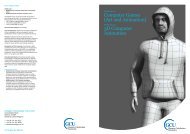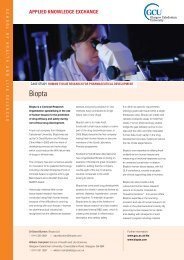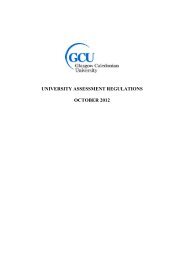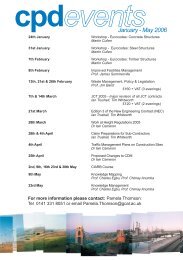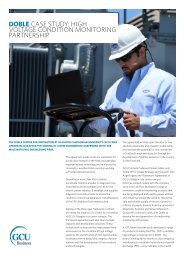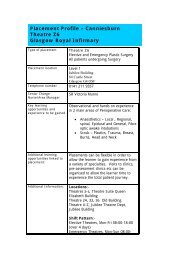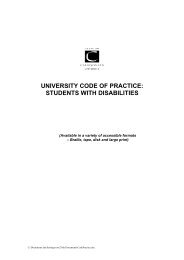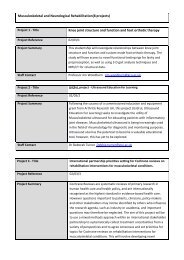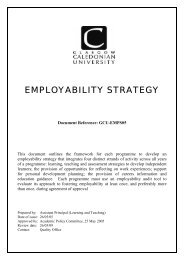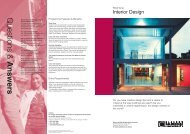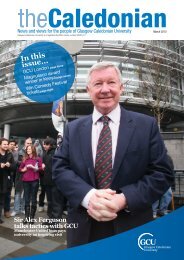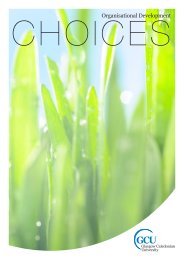Winter 2007 - Glasgow Caledonian University
Winter 2007 - Glasgow Caledonian University
Winter 2007 - Glasgow Caledonian University
You also want an ePaper? Increase the reach of your titles
YUMPU automatically turns print PDFs into web optimized ePapers that Google loves.
The magazine for alumni and friends of <strong>Glasgow</strong> <strong>Caledonian</strong> : Issue 2 : winter 07<br />
Speaking out<br />
graduate jill daly reaches<br />
out over the airwaves<br />
s p i n - o u t s u c c e s s e s : a n n i v e r s a r y c r y s t a l b a l l : M e e t l o r d g u s m a c d o n a l d
Join us in celebrating our 15th<br />
anniversary of being a <strong>University</strong><br />
<strong>Caledonian</strong> Crystal Celebrations<br />
Sparkling past, glittering future<br />
We would like to welcome our alumni back to a special ball in<br />
honour of our crystal anniversary. The evening will kick off with a<br />
drinks reception and dinner with guest speaker, and guests can let<br />
their hair down at a disco and Ceilidh. We will also reveal our first<br />
ever Alumnus of the Year.<br />
The Alumni Crystal Ball is the perfect opportunity to catch up with old<br />
friends and see how <strong>Glasgow</strong> <strong>Caledonian</strong> <strong>University</strong> has changed over<br />
the years. Why not make a day of it and take the chance to explore the<br />
campus while you’re here?<br />
If you are a graduate of <strong>Glasgow</strong> <strong>Caledonian</strong> <strong>University</strong> or any<br />
of our former institutions, we would love to see you there.<br />
What you need to know:<br />
When: 7pm, Thursday April 24 2008 (carriages at 2am)<br />
Where: Thistle Hotel, <strong>Glasgow</strong><br />
How: For further information and to pre-register for the event,<br />
visit www.gcal.ac.uk/alumni. Tickets are £40 per person and go<br />
on sale in December <strong>2007</strong>.<br />
A<br />
l u m n<br />
i C<br />
r y<br />
s<br />
t a<br />
l<br />
B a<br />
l l
contents<br />
20<br />
10<br />
04 principal’s welcome<br />
A message from Professor Pamela Gillies<br />
05 news<br />
What’s new at <strong>Glasgow</strong> <strong>Caledonian</strong><br />
<strong>University</strong> including awards, facilities,<br />
events and fundraising<br />
10 Kit-out your business<br />
An overview of the latest knowledge<br />
transfer project between the <strong>University</strong><br />
and external partners<br />
11 business spotlight<br />
Three graduates and their companies<br />
19 fighting back<br />
Two brave diabetes sufferers<br />
explain how they didn’t let their<br />
condition hold them back<br />
20 our new chancellor<br />
Meet Lord (Gus) Macdonald<br />
22 the 5-minute interview<br />
Alumnus Khalid Mohammad<br />
Abdulrahim shares his successful career<br />
in building and civil engineering<br />
16<br />
22<br />
12 impressive facilities<br />
Discover what the <strong>University</strong> has to offer,<br />
including a new Students’ Association<br />
building, the Arc and much more<br />
12<br />
Get in touch<br />
What would you like to see in these pages?<br />
Make your voice heard:<br />
Telephone: +44 (0) 141 331 8769<br />
Write: <strong>Caledonian</strong>+, <strong>Glasgow</strong> <strong>Caledonian</strong> <strong>University</strong>,<br />
Development & Alumni Relations Office,<br />
70 Cowcaddens Road, <strong>Glasgow</strong> G4 0BA<br />
Email: alumni@gcal.ac.uk Web: www.gcal.ac.uk/alumni<br />
Designed and published on behalf of glasgow caledonian university<br />
by White Light MEdiA www.whitelightmedia.co.uk<br />
in this issue<br />
Welcome to the second edition of our<br />
new-look magazine, <strong>Caledonian</strong> +. GCU prides<br />
itself on being one of the most dynamic and vibrant<br />
universities in Scotland. With students representing<br />
90 countries across the globe, GCU has merged local<br />
customs and traditions with an international twist.<br />
With more international graduates than ever before, our alumni have<br />
contributed significantly to the Scottish economy as well as returning to<br />
their homelands with their new-found skills and experiences. <strong>Caledonian</strong><br />
+ will be an avenue to publicise some of the many achievements that<br />
these alumni have accomplished alongside news from the <strong>University</strong>.<br />
Following on from our late Chancellor Magnus Magnusson,<br />
the <strong>University</strong> is proud to present the new Chancellor, Lord Gus<br />
Macdonald – his vision and thoughts can be read on p20.<br />
Diabetes presents a serious health challenge for the world. There<br />
are believed to be over 200,000 Scots with diabetes and many<br />
thousands more who are as yet undiagnosed. The number of people<br />
developing diabetes may double in the next 10-15 years. The special<br />
feature in this issue (p14-19) focuses on the silent killer – diabetes.<br />
As mentioned, the <strong>University</strong> has become a stepping stone for<br />
students to become successful entrepreneurs, businessmen/women<br />
and global leaders. Some of these alumni are featured in our Business<br />
Spotlight section (p11). On the note of global business, Khalid<br />
Mohammad Abdulrahim takes part in the 5-minute Interview (p23).<br />
Finally, if you have not already done so, we would appreciate it if you<br />
could update your email details on our website. If you are a graduate or<br />
friend of the <strong>University</strong> and have an interesting story, please contact the<br />
alumni department. Thank you and enjoy!<br />
Regards,<br />
All rights reserved. Material contained in this publication may not be reproduced, in<br />
whole or in part, without prior permission of glasgow <strong>Caledonian</strong> <strong>University</strong> (OR OTHER<br />
COPYRIGHT OWNERS). Whilst every effort is made to ensure that the information given<br />
herein is accurate, no legal responsibility is accepted for any errors, omissions or<br />
misleading statements. NEITHER glasgow <strong>Caledonian</strong> <strong>University</strong> NOR THE EDITOR NECESSARILY<br />
AGREE WITH THE VIEWS EXPRESSED IN THE MAGAZINE.<br />
Mansoor Ali, Editor<br />
Alumni Relations Officer<br />
3
from the principal<br />
Making history<br />
I<br />
would like to welcome all those who graduated<br />
recently at our <strong>Glasgow</strong> and Oman campuses<br />
to our growing family of over 60,000 alumni<br />
worldwide. We are very proud of your<br />
achievements and we hope you will stay in<br />
touch with the <strong>University</strong> – playing a part in<br />
our future as well as our past.<br />
This September I was honoured to take a seat on the<br />
Scottish Council of the Confederation of British Industry<br />
(the CBI) – making history as the first university principal<br />
to be elected by the CBI. I look forward to the debate,<br />
discussion and challenge that membership of this<br />
influential body will bring. We are tasked with promoting<br />
the interests and welfare of industry and commerce in<br />
Scotland. This appointment comes as the <strong>University</strong><br />
moves into a new era of collaboration with the business<br />
sector, focusing on social enterprise wherever possible.<br />
revamping facilities<br />
Also in September, I had the privilege of opening the new<br />
Students’ Association premises in the North Hanover<br />
Building. I was somewhat bemused, although not entirely<br />
surprised, to find that a second bar had been squeezed<br />
into the building! In October Her Royal Highness, The<br />
Princess Royal visited to open the new Continuing<br />
‘Crystal <strong>Caledonian</strong>’ will be<br />
an opportunity to reflect<br />
on our many achievements<br />
Personal Development Centre – a comprehensive<br />
refurbishment of the former library in the William<br />
Harley Building. I hope you will come and see the<br />
transformation either on a tour of the campus or as a<br />
visiting delegate on one of our training courses.<br />
I am delighted that Lord (Gus) Macdonald, a man<br />
justly renowned for his intellect, political acumen and<br />
eloquence, is our new Chancellor. With his strong<br />
<strong>Glasgow</strong> roots, a passion for social justice and natural<br />
warmth he is the perfect incumbent for an energetic<br />
Scottish <strong>University</strong> committed to social inclusion<br />
and enterprise. Lord Macdonald’s duties include<br />
conferring degrees, promoting the <strong>University</strong>’s image<br />
throughout the world and furthering its interests at<br />
home and abroad.<br />
At our graduation ceremonies in July and November<br />
I was thrilled to bestow a further nine honorary degrees<br />
in recognition of individuals’ contributions to society<br />
and their chosen professions. You can read about each<br />
of the recipients on our website.<br />
I am looking forward to the <strong>University</strong>’s Christmas<br />
Concert on December 12, featuring the <strong>Glasgow</strong><br />
Chamber Orchestra and the <strong>University</strong> Choir. The<br />
choir, despite having been established just two years<br />
ago, has over 30 members, comprising staff, students<br />
and alumni. We also plan to hold the first Magnus<br />
Magnusson Fellowship Lecture early in the New<br />
Year and to award the first grants from the Magnus<br />
Magnusson Fund, which now stands at almost<br />
£100,000.<br />
I hope you will make it back to your Alma Mater<br />
in April 2008 to take part in our 15th anniversary.<br />
<strong>Caledonian</strong> Crystal Celebrations will be an<br />
opportunity to reflect on our many achievements<br />
thus far and to demonstrate how we intend to<br />
achieve our vision for 2015 – to have made <strong>Glasgow</strong><br />
<strong>Caledonian</strong> the most innovative and forwardthinking<br />
university in the UK.<br />
Welcome to another edition of <strong>Caledonian</strong>+, the<br />
magazine for alumni and friends of the <strong>University</strong>, I<br />
hope you find it enjoyable and that you keep in touch.<br />
Professor Pamela Gillies<br />
Principal and Vice-Chancellor
Alumni Achievement Award<br />
<strong>Glasgow</strong> <strong>Caledonian</strong> <strong>University</strong> is delighted to<br />
announce this new annual award to recognise<br />
the achievements of one of our graduates. We<br />
are currently taking nominations for next year’s<br />
award, which will be presented at the Alumni<br />
Crystal Ball on April 24. The winner will receive<br />
two complimentary tickets to the event, travel and accommodation<br />
expenses as well as a certificate in recognition of their success, and the<br />
honour of holding the Alumni Achievement Award trophy for the year.<br />
If you know of a graduate, including yourself, who has excelled<br />
in his or her chosen field, has contributed to the community in an<br />
outstanding way or made significant humanitarian contributions<br />
why not make a nomination today?<br />
For further information call: +44 (0) 141 331 8769<br />
email: alumni@gcal.ac.uk or visit: www.gcal.ac.uk/alumni<br />
new faces<br />
An overview of two of <strong>Glasgow</strong> <strong>Caledonian</strong> <strong>University</strong>’s latest recruits<br />
Alison Steel<br />
The Director of Marketing and Communications shares<br />
her initial impressions of working at the <strong>University</strong>.<br />
“<strong>Glasgow</strong> <strong>Caledonian</strong> has a tremendous sense of<br />
energy and focus, which is still pretty unusual in higher<br />
education. I’ve been impressed by the <strong>University</strong>’s<br />
commitment to improving the student experience<br />
through pioneering facilities such as the Saltire Centre<br />
and through initiatives like the <strong>Caledonian</strong> Academy,<br />
which is at the forefront of learning and teaching.<br />
From a marketing point of view, it’s exciting to see<br />
how outward looking the <strong>University</strong> is. Not only is it<br />
socially enterprising, inclusive and supportive of its<br />
local communities, GCU is fully committed to using<br />
its research and knowledge transfer for Scotland’s<br />
economic benefit.<br />
The <strong>University</strong> has<br />
a great story to tell<br />
and the Marketing and<br />
Communications team<br />
will take a fully integrated<br />
approach to communicating<br />
that story to the wider world.<br />
We are also looking forward<br />
to working with colleagues<br />
to improve internal<br />
communications and to<br />
enhance the website as a key<br />
marketing tool.”<br />
Declan Jones<br />
Head of Widening Access & Community<br />
Engagement, Declan is tasked with<br />
overseeing and developing links between<br />
the <strong>University</strong> and <strong>Glasgow</strong>.<br />
“The ability of GCU to recruit<br />
students, retain them and produce<br />
graduates equipped for 21st century<br />
global citizenship requires excellence not<br />
just in learning, teaching and research<br />
but in delivering added value to our<br />
‘customers’, our host community and to<br />
the wider social good.<br />
Our work will<br />
include supporting and<br />
Our work will include<br />
supporting and developing<br />
activities to widen access”<br />
developing activities to<br />
widen access, promoting<br />
civic participation<br />
and engagement with<br />
community organisations,<br />
developing social entrepreneurs and extending the<br />
cultural and artistic contributions of the <strong>University</strong> to<br />
the campus and the wider city through partnership and<br />
collaboration with external agencies.<br />
We need to engage with the GCU community to<br />
discover what staff think about the opportunities the<br />
<strong>University</strong> has to make big positive impacts in the lives<br />
of our students, alumni, the staff themselves and the<br />
communities of this great city.”
news<br />
BBC archive comes<br />
to the Saltire Centre<br />
The BBC has been part of the British<br />
conscience and mind for around 75 years and<br />
there is no denying that the contents of the<br />
BBC archive are a remarkable resource, unlike<br />
any other in the world. The BBC has been<br />
understandably guarded about the opening<br />
of its archive, but it has finally decided to do<br />
just that via a dynamic, multi-million pound<br />
project called the Spoken Word, housed<br />
within the Saltire Centre at the heart of the<br />
<strong>Glasgow</strong> <strong>Caledonian</strong> <strong>University</strong>’s campus.<br />
Students can locate items in a librarystyle<br />
catalogue and listen to or watch<br />
defining moments across history – from<br />
“The Spoken Word broadcasts<br />
lectures and video podcasts<br />
using BBC programmes<br />
the opening and closing speeches of the<br />
Nuremberg Trials to the moment that man<br />
walked on the Moon. As an educational<br />
resource, the BBC archive brings a previously<br />
unforeseen dimension to the way that<br />
students learn and communicate.<br />
The “legal deposit” agreement that exists<br />
between the Spoken Word and the BBC<br />
is completely unique and unprecedented.<br />
Anyone with an educational background,<br />
including alumni, can sign up to the service,<br />
‘log on’ to the Spoken Word website<br />
and watch or listen to numerous BBC<br />
programmes for educational purposes.<br />
The Spoken Word also broadcasts<br />
lectures and video podcasts using BBC<br />
programmes and other media for professors<br />
and other academic staff. It includes<br />
recordings of witness seminars and public<br />
lectures of academic interest. The service<br />
can preserve and make any audio or video<br />
clip that is digital available through its<br />
browser-delivered catalogue.<br />
The development project is now in its final<br />
stages but it has been such a success that it is<br />
now becoming a permanent part of learner<br />
support within the <strong>University</strong>. Spoken Word<br />
Services is now embedded in the day- to-day<br />
life of <strong>Caledonian</strong> and it will continue to offer<br />
valuable library facilities to students and the<br />
wider academic world.<br />
For further information<br />
visit: www.spokenword.ac.uk<br />
6 <strong>Caledonian</strong>+
Fundraising success<br />
for Cally Dolls<br />
<strong>University</strong> receptionist Cathy Bain, has<br />
helped raise over £55,000 for Cancer<br />
Research. Cathy got together with other<br />
university staff, alumni and friends to form<br />
the ‘Cally Dolls’ and participate in a variety<br />
of fundraising events for Cancer Research.<br />
“Like so many people my Dad, other family<br />
members and friends have passed away from<br />
cancer,” said Cathy. “I have a good life, a<br />
great husband and good friends, so I feel we<br />
should all give something back and this is my<br />
way of saying thank you for what I have.”<br />
The Cally Dolls are increasing in number.<br />
This year fifty woman and five children<br />
participated in events, that included the<br />
5k Bishopbriggs run for the Blind and the<br />
<strong>Glasgow</strong> 5k run in June, to raise over £11,500<br />
for Cancer Research. Past events have<br />
included annual 5k and 10k runs, a 36-hour<br />
fast and various Comic Relief events.<br />
When asked what the future holds for<br />
the Cally Dolls, Cathy said: “We want more<br />
people to join the Dolls, we want to raise<br />
more money and in terms of the events, do<br />
more of the same!”<br />
Hillier returns from US professorship<br />
Student of the Year:<br />
Elaine Bruce<br />
Elaine Bruce is a true ambassador of<br />
the <strong>University</strong> and a fantastic role model<br />
for students. She worked as a Peer Mentor<br />
from September 2006 and provided informal<br />
support and guidance for new students<br />
coming to <strong>Glasgow</strong> <strong>Caledonian</strong>. Elaine<br />
went beyond the call of duty by attending<br />
college visits and supporting GCU events.<br />
She successfully juggled her role as a mentor<br />
with her honours year, work, family life and<br />
personal commitments. Elaine undoubtedly<br />
deserves this title and stands for everything<br />
a student at <strong>Glasgow</strong> <strong>Caledonian</strong> should be.<br />
Of the award she said: “I was totally stunned<br />
as so many other people make valuable<br />
contributions. I was delighted to receive it.”<br />
T<br />
From left to right: India Roberts, Jordan Martindale (current<br />
student president), Elaine Bruce & Cameron Fletcher<br />
Professor Chris Hillier, Department of<br />
Biological and Biomedical Sciences has just<br />
returned from his Visiting Professorship in<br />
the US where he retrained in RNAi – possibly<br />
the most exciting medical breakthrough of<br />
the century.<br />
RNAi is a cellular mechanism that<br />
allows specific genes to be shut down or<br />
‘silenced’, leading to changes in the progress<br />
of diseases like cancer. Its importance was<br />
highlighted when the discoverers of the<br />
mechanism were awarded the 2006 Nobel<br />
Prize for Medicine.<br />
Integrated DNA Technologies (IDT),<br />
the world’s largest manufacturer of<br />
oligonucleotides (DNA & RNA) invited Prof<br />
Hillier to use the experience of Biopta, the<br />
company he founded in 2002, to develop<br />
protocols that test the effects of RNAi in<br />
tissues. “In fact I became a student, being<br />
trained by world-class experts in RNAi<br />
and allowed access to amazing facilities<br />
at IDT’s corporate HQ in Coralville, Iowa”,<br />
said Prof Hillier. Dr Andrew Fire (Stanford<br />
<strong>University</strong>), one of the recipients of the<br />
Nobel Award and a collaborator with IDT,<br />
visited just after the announcement of his<br />
award and despite his new-found celebrity<br />
status he honoured his engagement to<br />
speak at the <strong>University</strong> of Iowa.<br />
Not satisfied with merely retraining,<br />
Prof Hillier also founded a new company,<br />
Sistemic Ltd, to develop technologies<br />
and services for users of RNAi. He also<br />
spoke at the Iowa City Rotary group<br />
and the Iowa City Educational Forum as<br />
well as publishing an article on Scottish<br />
entrepreneurial strategy in the Iowa<br />
Corridor Business Journal.<br />
Before returning to Scotland Prof<br />
Hillier had the pleasure of meeting Senator<br />
Hillary Clinton at a friend’s cocktail party.<br />
When he explained he would not be able<br />
to vote for her as he was heading home,<br />
she smiled and said: “Well, perhaps you’ll<br />
save it for Gordon.”<br />
7
news<br />
Welcoming Oman graduates<br />
The <strong>Caledonian</strong> College of Engineering in<br />
Oman is a private college affiliated with<br />
<strong>Glasgow</strong> <strong>Caledonian</strong> that was established<br />
in 1996. We are delighted to welcome a<br />
further 192 graduates and 175 diplomates to<br />
our growing family of over 2,000 alumni<br />
from the Oman College and over 60,000<br />
graduates worldwide.<br />
Oman Alumni Event<br />
In September a group of alumni met<br />
College and <strong>University</strong> staff to discuss<br />
networking opportunities for alumni in<br />
Oman. As a result, the College will host<br />
an alumni event on December 4 <strong>2007</strong><br />
and has plans for an alumni association in<br />
the region.<br />
For further information<br />
visit: www.caledonian.ac.uk/alumni<br />
We have lost touch with many of our<br />
graduates in the region. If you know of<br />
anyone who attended the College or of any<br />
GCU alumni living in the region please ask<br />
them to visit the website to update their<br />
details and register for the event.<br />
New Construction courses<br />
The School of the Built and Natural Environment<br />
launched two new postgraduate courses in<br />
September <strong>2007</strong> that have been tailored to<br />
meet the needs of industry and of students.<br />
The MSc Construction Economics and MSc<br />
Real Estate Management courses are aimed<br />
at graduates from a wide range of academic<br />
backgrounds who aspire to develop a career<br />
as a Chartered Surveyor. The courses are open<br />
to those holding degrees in<br />
Construction, Business, Economics, Geography,<br />
Law, and other humanities subjects.<br />
The MSc in Construction Economics<br />
develops students’ understanding of the<br />
financial aspects of the construction and<br />
property industries, whilst focusing on those<br />
industries in the context of the global economy.<br />
The MSc in Real Estate Management aims<br />
to equip students with essential business<br />
management skills, together with a sound<br />
understanding of commercial real estate<br />
valuation, investment and development.<br />
visit: www.bne.gcal.ac.uk for further<br />
information. Alternatively, please call<br />
John Leabody on +44 (0) 141 331 3271, or<br />
email: schoolbne@gcal.ac.uk
Development update<br />
T<br />
university support<br />
Magnus Magnusson<br />
Fellowship taking shape<br />
Our plans to establish a prestigious Magnus Magnusson<br />
Fellowship and Lecture are moving forward. Sally<br />
Magnusson has kindly accepted the Principal’s invitation to<br />
become the Honorary President of the Magnus Magnusson<br />
Fellowship and four prominent international figures have<br />
already agreed to become Magnusson Fellows. The first<br />
meeting will be held in early 2008 and we welcome<br />
suggestions for a suitable topic for debate by the Fellows at<br />
their first gathering. The inaugural Magnusson Lecture will<br />
take place on the same day as the Fellows meet and will be<br />
delivered by one of the founding Fellows.<br />
Helping nurses in Tajikistan<br />
Tajikistan was devastated by a civil war until 1997. Since then, peace has<br />
been tenuous and the country is highly dependent on foreign aid. Prof<br />
Barbara Parfitt, the Director of Global Health Development at <strong>Glasgow</strong><br />
<strong>Caledonian</strong>, has been providing nurses in the region with training and<br />
support. Speaking about her experience in the region, Prof Parfitt said:<br />
“Nursing has seen amazing developments since 1999 when I first worked<br />
in Tajikistan. They are motivated but with salaries that start at $3 per<br />
month and little or no equipment they have been really challenged. In<br />
spite of these difficulties they have become a strong group of women<br />
who are empowering those they care for.”<br />
Thanks to a very generous donation from <strong>Glasgow</strong>-born businessman<br />
Willie Haughey (Honorary Graduate), Prof Parfitt has given nursing bags<br />
worth £200 each to 300 nurses in Tajikistan. The Ministry of Health has<br />
agreed that the bags will be exempt from customs charges and fairly<br />
distributed – a process Prof Parfitt will be following to ensure they reach<br />
the right people. Nurses who attended a conference hosted by Prof<br />
Parfitt in Tajikistan have given input into what should be included in the<br />
bags. They are delighted with the gift and have sent Mr Haughey their<br />
personal thanks via an electronic presentation.<br />
To find out more information about the<br />
Magnus Magnusson Fellowship & Lecture,<br />
please visit: www.caledonian.ac.uk.<br />
Alumni ambassador<br />
programme<br />
The <strong>Glasgow</strong> <strong>Caledonian</strong> alumni ambassador initiative is an<br />
innovative programme, which is strengthening links between<br />
the <strong>University</strong>, our graduates and their employers. It encourages<br />
graduates to work with the <strong>University</strong> on a variety of activities<br />
including student work placements and mentoring, guest<br />
lecturing, participation in our activities and programmes, business<br />
technology and knowledge transfer partnerships, research,<br />
consultancy and fundraising.<br />
If you would like to be involved in the life of the <strong>University</strong><br />
please contact Jo Dowling to see how your skills can help to<br />
make a difference.<br />
For further information<br />
call: +44 (0) 141 331 8190<br />
email: jo.dowling@gcal.ac.uk<br />
visit: www.gcal.ac.uk/alumni/ambassadors<br />
Magnus Magnusson Fund taking off<br />
In June we celebrated the life of our former Chancellor Magnus Magnusson,<br />
and launched the Magnus Magnusson Fund in his honour. It has received<br />
a wonderful response from many generous individuals and organisations<br />
– almost £100,000 has already been donated including Gift Aid.<br />
Gordon Masterton (Honorary Graduate) one of the fund’s generous<br />
supporters said: “Although I didn’t know Magnus on a personal basis,<br />
I was impressed by his life-long love of learning and his passion for<br />
education. The fund will allow more young people to realise their full<br />
potential. What better way to remember this great man?”<br />
The <strong>University</strong> will channel this support into a number of<br />
Magnus Magnusson Awards for young people over the coming threefive<br />
years. Every penny donated will be used to help a young person,<br />
so the more that is given the greater the impact and reach of the<br />
Magnus Magnusson Awards.<br />
To find out more information about the Magnus Magnusson Fund,<br />
please visit: www.caledonian.ac.uk.
KIT-OUT<br />
your business<br />
KIT-OUT (Knowledge, Innovation &<br />
Technology Out of <strong>University</strong> into<br />
Tourism) the Park is the latest in a long<br />
line of Knowledge Transfer Projects<br />
between <strong>Glasgow</strong> <strong>Caledonian</strong> <strong>University</strong><br />
and its outside partners.<br />
The project aims to encourage the uptake of<br />
the latest technological developments by small<br />
and medium sized businesses in Loch Lomond and<br />
Trossachs National Park. The project offers scientists<br />
and researchers at <strong>Glasgow</strong> <strong>Caledonian</strong> <strong>University</strong><br />
a great opportunity to commercialise some of their<br />
latest technologies. By linking up with the <strong>University</strong><br />
companies will be able to access some of the latest<br />
technologies to improve their business performance and<br />
gain an edge in a very competitive global market place.<br />
integrating technologies<br />
The project operated by the <strong>University</strong> and Scottish<br />
Enterprise, focuses on businesses operating in the tourism<br />
sector. The key objective of the project is to help small<br />
companies to improve their business performance,<br />
develop new products and services, and increase their<br />
competitive edge through the adoption and integration of<br />
the latest technologies in five key sectors:<br />
IT & communications<br />
Business process improvement<br />
Food technology<br />
Green tourism/use of renewable technology<br />
Sustainable buildings & construction methods<br />
“All companies need to innovate or they will be left<br />
behind by increased competition or new technological<br />
developments,” said Derek Gallaher, Project Manager. “It<br />
can often be hard for small and medium sized companies to<br />
innovate or integrate new technology into their businesses,<br />
due to lack of time or resources. By participating in KIT-OUT<br />
the Park, tourism based companies will, for the first time, be<br />
able to get assistance and support to do so, by having access<br />
to expert advice on an ongoing basis.”<br />
Companies participating in the project will be<br />
able to take advantage of regular advice and support<br />
from tourism experts and sector specialists to help<br />
them develop their ideas and put them into practice<br />
within their own businesses. Furthermore, expertise<br />
on the potential to increase profits and sales plus the<br />
opportunity to develop new products and access new<br />
markets will be made available.<br />
The project has an initial geographic focus on<br />
the Loch Lomond and Trossachs National Park, but it<br />
is anticipated that it will spread its reach to a wider<br />
geographic area across Scotland.<br />
KIT-OUT the Park is a three-year programme, running<br />
until 2010. It is funded by the Scottish Executive’s Expertise,<br />
Knowledge and Innovation Transfer Fund (SEEKIT) and the<br />
European Regional Development Fund (ERDF).<br />
For further information on KIT-OUT<br />
visit: www.kit-out.org<br />
10
Business Spotlight<br />
RG Bespoke Joinery Ltd<br />
Name: Colin A Gilchrist Course: BSc Building Engineering & Management<br />
Year of graduation: 1993<br />
What does your company do?<br />
RG Bespoke Joinery manufactures purpose made<br />
joinery items for the construction industry and for the<br />
private market. It specialises in hardwoods and has<br />
a wealth of experience in restoration and renovation<br />
works. The company will make almost any timber joiner<br />
made item to customer specification, sizes or drawings.<br />
It offers a design service and a quality finish.<br />
Common items for manufacture are doors, entrance<br />
screens, windows, gates, fitted furniture, stairs and<br />
reception counters. The company manufactures and<br />
supplies to wood rot specialists and contractors.<br />
How can we find out more?<br />
Contact RG Bespoke Joinery on Tel: +44 (0) 141 429 1848<br />
email: beautifulwood@bespoke-joinery.com or<br />
visit: www.bespoke-joinery.com<br />
van Oppen & Co Limited<br />
Name: Charles van Oppen course: BA Risk Management<br />
Year of graduation: 1996<br />
What does your company do?<br />
van Oppen is a specialist consultancy in Risk<br />
and Insurance Communication Management<br />
based in London. It produces world-class risk and<br />
insurance underwriting presentations for large,<br />
international businesses.<br />
Producing top quality insurance risk reports<br />
involves mapping, gathering and collating a large<br />
volume of data from multiple sources and analysing<br />
the data to explain the risk profile. van Oppen was<br />
proud to be awarded ‘European Risk Management<br />
Service Provider of the Year 2005’.<br />
How can we find out more?<br />
Contact van Oppen & Co Ltd on Tel: +44 (0) 20 7173 6110<br />
email: enquiries@vanoppen.co.uk, or<br />
visit: www.vanoppen.co.uk<br />
BlueOrange Consulting Ltd<br />
Name: Stewart Murray Milton Course: MBA Year of graduation: 1994<br />
What does your company do?<br />
BlueOrange was founded in 2001. It has a<br />
desirable client base and an extensive network of<br />
partner companies in ten countries across Europe.<br />
It is a fast-growing business solutions company<br />
that provides software, training and consulting<br />
services to a wide range of global clients. Launched<br />
in 2004, its eStore, webnomad.co.uk, focuses on<br />
growing niche software solutions.<br />
Stewart lived and worked abroad as Head of<br />
Management Consulting for a foreign government<br />
ministry before establishing his own company.<br />
How can we find out more?<br />
Contact BlueOrange Consulting Ltd on<br />
Tel: +44 (0) 141 849 6264, email: stewart@blueorange.<br />
org.uk or visit: www.webnomad.co.uk<br />
11
Discover what<br />
the <strong>University</strong> has to<br />
The Students’ Association – has moved<br />
to new premises in the North Hanover Street<br />
Building, opposite the Arc. Come back with some<br />
old friends and see how the building might have<br />
changed. One thing for sure is that everyone<br />
still knows how to have a good time. Lifetime<br />
membership costs just £10.<br />
For more information:<br />
t: +44 (0) 141 331 3886<br />
e: students.association@glasgow-caledonian.ac.uk<br />
w: www.caledonianstudent.com<br />
The Arc – is the <strong>University</strong>’s state-ofthe-art<br />
recreation centre. It houses three<br />
separate gym areas, an aerobics studio,<br />
exhibition space and a large multi-purpose<br />
games hall, offering a range of classes<br />
and activities including: circuit training,<br />
badminton, kickboxing and handball. With<br />
a beauty therapy & hairdressing salon all<br />
under one roof it’s a great place to visit again<br />
and again. Discounted rates are available for<br />
all graduates.<br />
For more information:<br />
t: +44 (0) 141 331 3116<br />
e: arc@gcal.ac.uk<br />
w: www.caledonian.ac.uk/arc<br />
The Saltire Centre – is an award winni<br />
new facility right at the heart of campus,<br />
featuring a stunning new library, informat<br />
and study facilities. Access is available fre<br />
of charge for reference purposes and ann<br />
membership is just £30 for graduates.<br />
Opening times<br />
Monday-Friday: 08:00-23:00<br />
Saturday & Sunday: 09:00-18:00<br />
For more information:<br />
t: +44 (0) 141 273 1000<br />
e: baseadmin@gcal.ac.uk<br />
w: www.gcal.ac.uk/thesaltirecentre<br />
12
offer<br />
Read<br />
on to find out more about the wealth of facilities <strong>Glasgow</strong><br />
<strong>Caledonian</strong> <strong>University</strong> has on offer for you<br />
ng<br />
ion<br />
e<br />
ual<br />
Want to work here?<br />
You could join one of over 150 alumni who have returned to the<br />
<strong>University</strong> as members of staff. As well as our academic posts, the<br />
<strong>University</strong> has a full range of supporting departments from Finance<br />
and IT, to Marketing, Print and Design, and of course the newly formed<br />
Development and Alumni Relations Team.<br />
“I enjoyed studying at <strong>Caledonian</strong> and it was good to return to<br />
somewhere so familiar for work. Since my time as a student here the<br />
staff team in Law have developed an impressive range of studies. It’s<br />
satisfying to be involved in such an enthusiastic and hard working<br />
academic environment.” William Henderson, Lecturer in Law, <strong>Glasgow</strong><br />
<strong>Caledonian</strong> <strong>University</strong>.<br />
For more information<br />
w: www.gcal.ac.uk/jobs<br />
The Careers Service<br />
Looking for work? Contact the careers<br />
service to make an appointment to see<br />
one of our advisers.<br />
t: 0141 273 1000<br />
w: www.gcal.ac.uk/student/careers/graduates<br />
Looking for staff? You can advertise your<br />
graduate vacancies, placements and parttime<br />
jobs on the Careers Service website.<br />
For more information:<br />
t: +44 (0) 141 331 3882<br />
w: www.gcal.ac.uk/student/careers/employers<br />
13
“There are currently more<br />
than two million people with<br />
diabetes in the UK (250,000<br />
in Scotland), and an<br />
estimated further<br />
750,000 people who<br />
have the condition<br />
but have not been<br />
diagnosed”<br />
14
Tackling diabetes<br />
Tackling a<br />
global killer<br />
DIABETES KILLS AS MANY PEOPLE<br />
worldwide as HIV. If you had to read<br />
that sentence again, you’re not alone.<br />
Because, despite accounting for 6% of<br />
global mortality, diabetes is an illness<br />
that is greatly misunderstood, with an impact that is<br />
often underestimated. Most people would guess that<br />
cancer affects one in three people, that heart disease<br />
is the leading cause of death in the US and that HIV<br />
affects millions in Africa. Yet diabetes is often seen as<br />
little more than a problem with having too much sugar<br />
in the system. In fact, globally, it is the main cause of<br />
blindness, limb amputation and kidney failure, and a<br />
leading cause of stroke and heart attack.<br />
Diabetes mellitus is an illness characterised by<br />
high blood sugar levels (hyperglycaemia), resulting<br />
either from the body being unable to produce enough<br />
insulin (Type 1) or having an abnormal resistance to<br />
insulin (Type 2). There are currently more than two<br />
million people with diabetes in the UK (250,000 in<br />
Scotland), and an estimated further 750,000 people<br />
who have the condition but have not been diagnosed.<br />
Of particular concern for health professionals is Type<br />
2 diabetes, which accounts for 85% of diabetes<br />
patients. Type 2 diabetes is triggered (in people with<br />
a genetic disposition to the illness) by obesity and<br />
inactivity, and it is rising at an alarming rate. Once<br />
only affecting a small proportion of predominantly<br />
overweight adults, Type 2 diabetes is now seen in<br />
children for the first time, as obesity levels in the<br />
developed world continue to increase.<br />
devastating in developing nations<br />
<strong>Glasgow</strong> <strong>Caledonian</strong> <strong>University</strong> is leading efforts to<br />
tackle the rising problem of diabetes. The groundbreaking<br />
work of its Diabetes Education and Training Unit is<br />
complemented by a programme of ongoing research,<br />
and with the help of a number of diabetes charities,<br />
the <strong>University</strong> is also investing heavily in research PhD<br />
studentships. Its efforts are not confined to the UK.<br />
Diabetes affects 246 million patients worldwide, and<br />
has devastating consequences in developing nations<br />
who do not benefit from the high level of healthcare<br />
enjoyed in the developed world. With this in mind,<br />
lecturers Stuart Baird and Christine Skinner are<br />
pioneering education and training programmes in the<br />
Middle East and Far East and campaigning for greater<br />
awareness of the serious effects of the illness.<br />
Diabetes is on the increase. Affecting millions<br />
of people across the world, the effects of the<br />
illness can be devastating. lisa drysdale hears<br />
how work by experts aT <strong>Glasgow</strong> <strong>Caledonian</strong><br />
university has a huge impact on diabetes<br />
sufferers in the uk and the developing world<br />
For the UK at least, research efforts such as that underway<br />
at <strong>Glasgow</strong> <strong>Caledonian</strong> and other universities and medical<br />
institutes are delivering significant improvements.<br />
“Lots of new research is underway,” explains Dr Jane<br />
Nally, a lecturer in Biological and Biomedical Sciences<br />
and member of the Diabetes Education and Training<br />
Unit. “Two new drugs to treat diabetes have been<br />
licensed already this year, and other drugs will appear<br />
on the market shortly. A new method of delivering<br />
insulin, via an inhaler, is also now available to patients.<br />
All in all, it’s a very exciting and important time to be<br />
involved in diabetes research.”<br />
GCU hopes to extend the in-house expertise in<br />
diabetes and other health areas to reach people in<br />
the developing world. We will explore the ambitious<br />
Global Community Health initiatives in future issues<br />
of <strong>Caledonian</strong>+.<br />
Diabetes: the facts<br />
The numbers of people affected by diabetes worldwide is<br />
predicted to rise from 246 million to 280 million by 2025<br />
Diabetes is expected to cause 3.8 million deaths (6% of<br />
global mortality) in <strong>2007</strong><br />
Somewhere in the world a limb is lost to diabetes every<br />
30 seconds<br />
Almost 80% of diabetes deaths occur in low and<br />
middle-income countries<br />
Around 50% of diabetics die of cardiovascular disease<br />
and 10-20% of kidney failure. Overall, people with<br />
diabetes are twice as likely to die prematurely as people<br />
without the condition<br />
15
Saving the<br />
For most people in the developed world, diabetes is a<br />
serious but manageable disease. Yet the devastating<br />
nature of the condition in less fortunate nations<br />
is often overlooked. LIZ LONGDEN HEARS FROM two<br />
lecturers who are working to change that<br />
FEW PEOPLE ARE AWARE OF<br />
IT, but diabetes is one of the<br />
world’s biggest killers – a fact<br />
that Stuart Baird and Christine<br />
Skinner at <strong>Glasgow</strong> <strong>Caledonian</strong><br />
<strong>University</strong> are determined to drive home.<br />
“People think diabetes is just a wee bit of<br />
sugar in the water, but it has devastating<br />
effects,” says Stuart. Indeed, the true<br />
extent of the condition is staggering: 70%<br />
of all non-traumatic limb amputations<br />
are a direct result of diabetes, translating<br />
as one amputation every 30 seconds<br />
somewhere in the world.<br />
Having travelled the world observing<br />
treatment and providing training, it’s a<br />
problem with which Stuart and Christine<br />
are all too familiar. Acting in both an<br />
academic and clinical capacity, the<br />
lecturers from <strong>Glasgow</strong> <strong>Caledonian</strong>’s<br />
Division of Podiatric Medicine and<br />
Surgery have championed the drive<br />
to raise awareness of diabetes on an<br />
international scale. “Public education is<br />
targeted at preventing diabetes, and that<br />
is correct, but I believe there should be a<br />
secondary campaign that says ‘these are<br />
the effects of diabetes’,” says Christine.<br />
dangerous effects<br />
Sadly, for many patients these effects can<br />
be very serious. Though the condition can<br />
be managed through insulin treatment,<br />
associated health problems include<br />
numbness in the extremities (peripheral<br />
neuropathy), damage to eyesight leading<br />
to blindness, and an increased risk of<br />
kidney disease, cardio-vascular disease,<br />
heart attack and stroke. Stuart and<br />
Christine specialise in the podiatric effects<br />
of the illness. In many patients, narrowing<br />
of the arteries impedes circulation and<br />
16
Tackling diabetes<br />
forgotten patients<br />
the blood supply to the peripheral nerves,<br />
resulting in one or both feet becoming<br />
completely numb. Unable to feel pressure<br />
or trauma, the patient is particularly<br />
vulnerable to accidents, and high levels<br />
of sugar in the blood provide an ideal<br />
environment for bacteria, making the<br />
rapid spread of infection a real danger.<br />
If the problem is not caught quickly,<br />
amputation is often the only option.<br />
Stuart and Christine recall one patient<br />
in his early 40s who had undergone<br />
amputation below the left knee and had<br />
lost his eyesight due to diabetes. Whilst<br />
out walking with his guide dog, a lady<br />
wearing high heels trod on the patient’s<br />
foot. Unable to see or feel his injury, the<br />
patient did not seek medical attention<br />
and the wound became gangrenous.<br />
Tragically, the patient lost his other leg<br />
and died a few months later.<br />
early intervention is vital<br />
This scenario is less likely in the UK,<br />
where patients have access to podiatric<br />
care, but for people in developing<br />
countries the situation is very different.<br />
“In many developing countries there is no<br />
early intervention and the patient is never<br />
assessed,” explains Stuart. “The next thing<br />
the patient knows, their limb has been<br />
amputated.” With no state support system,<br />
the incapacitation of a family breadwinner<br />
can have devastating consequences,<br />
and a lack of follow-up care means<br />
that amputees struggle to rehabilitate<br />
themselves into society. The physical<br />
trauma of an amputation can be massive<br />
– Christine highlights research estimating<br />
that 50% of below-the-knee amputees<br />
in the developing world are likely to die<br />
within 10 years of being operated.<br />
“The frustrating thing is that there is a<br />
huge need for diabetic foot management<br />
yet developing countries don’t have<br />
the funds to provide this,” says Stuart.<br />
“As many as 85% of these amputations<br />
could have been prevented by simple<br />
training and education programmes.<br />
For example, a patient in Oman walked<br />
bare foot on scorching hot tarmac to<br />
change the tyre on his truck, resulting<br />
in horrendous burns to the soles of his<br />
feet. A simple solution would have been<br />
having someone to tell him not to take his<br />
sandals off.”<br />
Determined to provide education and<br />
training in developing countries, Stuart<br />
and Christine have spent the last decade<br />
introducing healthcare programmes in the<br />
Far East and Middle East. In 1997, they<br />
established their first overseas programme<br />
in diabetic foot management in Malaysia,<br />
teaching doctors and nurses how to<br />
undertake screening and simple patient<br />
assessment, categorise patients according<br />
to risk, and carry out simple routine care.<br />
They returned two years later to find<br />
clinics set up by doctors they had trained<br />
providing a very high standard of care.<br />
spreading the word<br />
For the past eight years the lecturers<br />
have delivered workshops and lectures<br />
to 3,500 doctors from across the Middle<br />
East at the Pan Arab Conference on<br />
Diabetes in Cairo, and their work has also<br />
won recognition from the World Health<br />
Organisation (WHO), which invited<br />
them to review diabetic foot provision<br />
in Oman. This resulted in a report of<br />
recommendations and the delivery of a<br />
five-day programme to educate nurses<br />
and doctors in rural areas. “Because of<br />
the work we’ve done for the Government<br />
and for the WHO, they’ve started to take<br />
diabetic foot health more seriously. It’s<br />
had a big impact,” says Stuart.<br />
<strong>Glasgow</strong> <strong>Caledonian</strong> is the only<br />
UK university conducting work of<br />
this kind in the field of diabetes. With<br />
170 undergraduate students and 102<br />
postgraduate students studying podiatry<br />
at the <strong>University</strong>, research efforts are<br />
growing steadily.<br />
“It’s vital that academics like ourselves<br />
have the clinical currency to be able<br />
to deal with problems and experience<br />
them first-hand,” says Christine. “Both<br />
Stuart and myself spend one session each<br />
week working in the diabetes centre at<br />
Southern General Hospital. That active<br />
involvement ensures that we are still<br />
invited to influence diabetes treatment in<br />
the countries that most need it.”<br />
So what developments would Stuart<br />
and Christine like to see in future? “If<br />
you can get to a patient early many<br />
of the devastating effects of diabetes<br />
can be prevented,” says Stuart. “Sadly,<br />
If you can get to a patient early many of the<br />
devastating effects of diabetes can be prevented”<br />
developing countries just don’t have the<br />
same podiatry services as we do, so we<br />
would love to see better health services.”<br />
“I’d like to see more students from<br />
these nations recruited to study podiatry<br />
over here, but the cost of the fouryear<br />
degree is often prohibitive,” adds<br />
Christine. “That is something I would like<br />
to see the UK Government tackle headon.<br />
Likewise, an awareness campaign<br />
would be very beneficial. I want more<br />
people to be aware of just how serious<br />
an issue diabetes is in less privileged<br />
countries, where just a small amount of<br />
support can bring huge rewards.”<br />
17
Understanding the<br />
journeyThe diabetes education and<br />
training Unit plays a crucial role in<br />
educating health professionals in<br />
current research on diabetes. LISA<br />
DRYSDALE investigates<br />
It goes without saying that<br />
the ultimate goal of research into<br />
most illnesses is to find a cure.<br />
However, the importance of<br />
understanding an illness cannot be<br />
underestimated. For health professionals,<br />
it means providing appropriate and meaningful care; for<br />
patients, it means looking after themselves to maintain<br />
the best possible quality of life; and for the general<br />
public it means a sense of empathy. It’s for these reasons<br />
that the work of the Diabetes Education and Training<br />
Unit at <strong>Glasgow</strong> <strong>Caledonian</strong> is so crucial.<br />
When the then Scottish Executive laid down the<br />
Scottish Diabetes Framework in 2002, education<br />
was flagged up as one of its priority areas in tackling<br />
diabetes. The Diabetes Education and Training Unit was<br />
established with this purpose in mind.<br />
It was very encouraging when the then<br />
Scottish Executive decided to invest heavily<br />
in additional services for diabetics”<br />
“The primary role of the department is to educate nurses,<br />
doctors, retinal screening nurses, dieticians and other health<br />
professionals in the latest research on the disease,” says Dr<br />
Jane Nally, lecturer in Biological and Biomedical Sciences.<br />
“The course covers diagnosis and treatment of diabetes,<br />
complications that can be encountered and how these may<br />
be resolved, the inter-professional relationships involved in<br />
treating a patient and the patient journey itself.”<br />
updating knowledge<br />
Usually health professionals will attend the <strong>University</strong> for<br />
the course but the department can also deliver it in the<br />
field to a large, non-local group. In addition to this, NHS<br />
Education for Scotland drafts in the team to provide oneday<br />
update sessions to hospital staff three times a year.<br />
“Prevention is always better than cure, so part of<br />
the battle against diabetes is encouraging people to<br />
maintain their fitness and not put on excess weight,” Jane<br />
continues. “Of course, that’s not always possible, so the<br />
next best thing is to make sure that diabetes is caught<br />
early when it presents.<br />
“It was very encouraging when the then Scottish<br />
Executive decided to invest heavily in additional services<br />
for diabetics, for instance introducing retinal screening<br />
for all diabetes patients. This could help to save the sight<br />
of a significant number of diabetes sufferers.”<br />
<strong>Glasgow</strong> <strong>Caledonian</strong> is also investing significantly<br />
in its research into the disease, by providing funding for<br />
three-year research PhD studentships. Diabetes charities<br />
provide financial support to advance the <strong>University</strong>’s<br />
research – several key pieces of work are under way.<br />
Work has begun on researching pregnancy and Type<br />
2 diabetes; the role of the immune system in diabetes;<br />
diabetes and muscle atrophy; and the pharmacology of<br />
small blood vessels.<br />
It is in this last area that Jane is particularly interested.<br />
“Diabetes causes blood vessels to contract in a different<br />
way and this can lead to high blood pressure, a huge<br />
problem for Type 2 sufferers,” she explains. “And it is the<br />
changes in the smaller blood vessels that are responsible<br />
for some of the most devastating effects of diabetes – loss<br />
of sight and renal failure – as well as increased sensitivity<br />
in the upper leg and loss of sensation in the lower limbs.”<br />
It is hoped that the combined work of the Diabetes<br />
Education and Training Unit and the <strong>University</strong>’s<br />
researchers will go some way in helping to tackle the<br />
onslaught of this increasingly common disease.<br />
18
Tackling diabetes<br />
Fightingback<br />
student Shazia Akhtar is drawing on her own experiences to advise Diabetes UK, whilst<br />
alumna Jill Daly is a DJ ON Europe’s first radio show for THE blind and partially sighted.<br />
They share their stories with LIZ LONGDEN AND LISA DRYSDALE<br />
Jill’s story<br />
Losing the power of sight is a terrifying<br />
prospect. But for Jill Daley blindness has fuelled, not<br />
dented, her ambitions. It gave her the motivation to<br />
forge a successful career in broadcasting which has<br />
led her to work with leading filmmakers and to an<br />
appearance on BBC Radio 4.<br />
Jill went blind at the age of 19 as a result of Type 1<br />
diabetes, and admits that it was immensely difficult to<br />
come to terms with. “At 19 I had no clue what I wanted<br />
to do,” she says. “It sounds strange, but it was through<br />
losing my sight that I gained focus. I had to stop and think<br />
‘what do I want to do with my life?’” What she wanted,<br />
she decided, was to work with sound and so she enrolled<br />
on a course in sound engineering, before studying for a<br />
Media degree at <strong>Glasgow</strong> <strong>Caledonian</strong>. After a stint writing<br />
features for local papers, and making a documentary<br />
which was screened by Scottish TV, she got a job at<br />
<strong>Glasgow</strong>-based Insight Radio, Europe’s first station for<br />
blind and partially sighted listeners, where she currently<br />
presents the lunchtime show.<br />
In 2005, writer and director Eleanor Yule invited Daly to<br />
work as an advisor to the actor Peter Mullan on her film<br />
Blinded, which explores the rage of a middle-aged man<br />
blinded in a car accident. Then, in 2006, she was invited<br />
to participate in Radio 4’s ‘Dinner in the dark’, in which<br />
a number of diners were placed in a pitch black room<br />
and served by blind waiters.<br />
Her radio work has a serious side to it. “It’s so<br />
important. If my family had something like this when I<br />
lost my sight it would have helped us so much. When<br />
something like that happens, you don’t know who to<br />
go to, you just feel completely lost. I really felt like I<br />
was out on an island.”<br />
Is she comfortable with the idea of being known as<br />
blind? “If that’s what it takes to help other people, then<br />
so be it. Trying to inspire people by letting them hear<br />
other people’s stories is what our show’s about. Saying<br />
to people that, of course it’s not good being blind, but<br />
it’s not the end of the world. I just love where I am right<br />
now. I feel very lucky and privileged.”<br />
Shazia’s story<br />
Student Shazia Akhtar, who is in the<br />
second year of her pharmacology degree at <strong>Glasgow</strong><br />
<strong>Caledonian</strong>, spends a large proportion of her spare time<br />
advising leading charity Diabetes UK.<br />
A diabetic herself, Shazia suffered from clinical<br />
depression for several years, which resulted in her<br />
eventually being hospitalised after she stopped<br />
eating and drinking. Following an intensive cognitive<br />
behavioural therapy course, she was approached by her<br />
dietician to speak about her experiences of diabetes and<br />
depression at an event hosted by Diabetes UK.<br />
“I was diagnosed with diabetes on 24 August 1989<br />
– it’s a memorable date for me because the disease has<br />
really changed my life,” says Shazia. “For a long time my<br />
diabetes prevented me from studying as I experienced a<br />
lot of complications and it certainly didn’t help matters<br />
when I was suffering from depression.<br />
“I was happy to share my experiences with Diabetes<br />
UK. I have spoken at other events held by the charity and<br />
by groups addressing diabetes in ethnic minorities.”<br />
Shazia also helped Diabetes UK to develop its<br />
‘Diabetes and depression’ leaflet. “I was<br />
part of a group advising the charity on the<br />
most important points to include,” Shazia<br />
explains. “One of the most crucial points<br />
is to recognise when you’re experiencing<br />
depression rather than having an off day.”<br />
Earlier this year Shazia was made<br />
a full-term advisory council member for<br />
Diabetes UK – she will help shape the<br />
charity’s priorities over the next three years.<br />
“The charity does an excellent job, but I<br />
think there is a need to involve more young people,”<br />
continues Shazia. “Only 5% of attendants at the charity’s<br />
last AGM were young people, yet diabetes is increasingly<br />
an issue for this group. There is also a need to involve<br />
more people from ethnic minorities.”<br />
Shazia also finds time to sit on the Scottish Executive<br />
sub-group on diabetes and ethnic minorities. “I hope<br />
that once I have graduated I’ll be able to combine my<br />
experience in this area with my scientific background to<br />
work full-time in the field.”<br />
19
ournew<br />
Meet<br />
chancellor<br />
In a career spanning 50 years, Lord Gus Macdonald<br />
has excelled across many areas of public life – as a<br />
journalist, TV executive, politician and businessman.<br />
Here he shares his excitement about his new role and<br />
his hopes for the <strong>University</strong>’s future<br />
Above: Back to his roots: at Clyde Port in 1997<br />
Left to right:<br />
With wife Teen and daughters Rowan (left) and Jean (right) early 1970’s<br />
With Magnus Magnusson and The Close Up team at the Scotsman<br />
Interviewing Prime Minister Margaret Thatcher in the 1980’s<br />
Chancellor of GCU in October <strong>2007</strong>-11-08<br />
20
<strong>Glasgow</strong> <strong>Caledonian</strong> feels very<br />
familiar to me. For many years at Scottish<br />
Television my office looked on to the<br />
campus. The Willie Harley Building is<br />
named after an old colleague. Our late and much<br />
loved Chancellor Magnus Magnusson even gave me<br />
my first job in journalism.<br />
GCU also appeals because it is a modern university,<br />
free of any lingering elitism. As such it helps encourage<br />
the social revolution now offering higher education to<br />
almost half our young people. By contrast, when I left<br />
school at 15 to become an apprentice engineer only one<br />
pupil in 20 went on to university.<br />
Fortunately six years in a <strong>Glasgow</strong> shipyard taught me<br />
a lot. You learned to work in teams but had to think for<br />
yourself. Engineering also dictates a useful attention to<br />
detail because if engineers get it wrong, things break and<br />
people can suffer.<br />
The disciplines of that industrial age moulded<br />
generations of working class youth. Sadly, the decline of<br />
manufacturing and collapse of apprenticeship systems<br />
helped undermine and demoralise many traditional<br />
communities. Universities have a key role to play in<br />
repairing that damage and creating new skills for the 21st<br />
century, collaborating ever more closely with schools,<br />
colleges and the world of work.<br />
As well as preparing students to compete in the global<br />
economy, we must explore opportunities for innovation<br />
and social enterprise with the public and voluntary sectors.<br />
But for me education’s primary purpose is to enable people<br />
to enjoy reasoning, discussion and open-minded exploration<br />
of art, science and society as a route to realising our full<br />
potential – both personally and collectively.<br />
My own career has sprawled across half a century<br />
– in engineering, media, business and politics. My hope<br />
is that some of that experience will be of value to the<br />
students and staff of GCU.<br />
For my part I look forward to discovering more about<br />
the work being done at our university on the enduring and<br />
emerging social problems that blight our society. Despite<br />
the remarkable progress and increasing prosperity of recent<br />
Our vision for 2015 is calculated to make us a<br />
strong and dynamic agent of social change”<br />
decades, too many have been left behind. GCU seems<br />
determined to address such problems and play a positive<br />
role in public life. Our vision for 2015 is calculated to make<br />
us a strong and dynamic agent of social change.<br />
Widening educational opportunity is central to<br />
building a more inclusive and successful society.<br />
Universities, in particular, expose students to an<br />
exhilarating range of people from different countries and<br />
cultures. Friendships made today in <strong>Glasgow</strong> may well last<br />
a lifetime, sustained ever more easily by the new media.<br />
I therefore look forward to working with the growing<br />
international army of GCU alumni in the hope that their<br />
past loyalties and present achievements can be used to<br />
support and enthuse the GCU graduates of tomorrow.<br />
THE NEW CHANCELLOR’S CV<br />
An overview of Lord Gus Macdonald’s varied career<br />
Educated at Scotland Street Primary and<br />
Allan Glen’s School in <strong>Glasgow</strong> 1945-55<br />
Marine engineer, Stephen’s Shipyard<br />
1956-62<br />
Circulation manager, Tribune, London<br />
1964-65<br />
Journalist, The Scotsman, Edinburgh<br />
1965-67<br />
Television producer, presenter and<br />
executive with Granada, and Channel<br />
Four 1967-85<br />
Scottish Television executive, managing<br />
director and subsequently chairman<br />
of enlarged Scottish Media Group<br />
1985-98<br />
Visiting professor of film and media<br />
studies, Stirling <strong>University</strong> 1985-98<br />
Elevated to House of Lords as Lord<br />
Macdonald of Tradeston 1998<br />
Ministerial appointments:<br />
Business and Industry in Scotland<br />
1998-99<br />
Minister for Transport, in attendance<br />
at Cabinet 1999-2001<br />
Minister for the Cabinet Office and<br />
Chancellor of the Duchy of Lancaster<br />
2001-03<br />
OTHER ROLES:<br />
Member of Lord’s Select Committee<br />
on Economic Affairs<br />
Chair of All Party Parliamentary<br />
Humanist Group<br />
Patron, Dystonia Society<br />
Governor of National Film and<br />
Television School 1986-97<br />
Advisory business roles<br />
21
The 5-minute interview<br />
Khalid Mohammad Abdulrahim<br />
Course: MSc in Construction Management<br />
Year of graduation: 2005<br />
Current position: Chairman, Cebarco Bahrain S.P.C<br />
How has your career progressed since graduation?<br />
There has been no significant change in progress in<br />
regards to my career progression but I would have<br />
to say that it has definitely broadened my thinking.<br />
What line of work is your company in?<br />
We work in the Building and Civil Engineering field.<br />
What projects are you currently working on?<br />
We are currently working on some really exciting<br />
and innovative projects. We have recently been<br />
awarded the contract to build the Abu Dhabi<br />
Formula 1 track in the United Arab Emirates at a<br />
cost of $650 million. The inaugural Abu Dhabi<br />
Grand Prix is scheduled for 2009, and I can assure<br />
you that it’s going to be a huge success! This has<br />
been a great achievement for everyone involved in<br />
the company. We are also working on the Bahrain<br />
City Centre Project ($500 million), which includes<br />
the largest mall in Bahrain and the second largest<br />
in the Gulf, the 27-km Durrat Highway, the Seef<br />
Flyover ($60 million), and the Bahrain Chamber of<br />
Commerce Building ($27 million).<br />
So far to date, what<br />
has been your greatest<br />
achievement personally?<br />
I would have to say<br />
personally, being awarded<br />
H.H The King Medal for<br />
services to the Kingdom and<br />
the people of Bahrain.<br />
Greatest achievement<br />
professionally?<br />
The construction of the<br />
Bahrain Formula 1 Circuit<br />
in 16 months and the<br />
overall development of my<br />
company are my greatest<br />
achievements. The F1 circuit<br />
in Bahrain only took 483<br />
days to complete and was<br />
finished ahead of schedule.<br />
Other achievements within my company would be<br />
the increase in balance sheet size and the reduction<br />
in gearing ratio.<br />
Why did you choose <strong>Glasgow</strong> <strong>Caledonian</strong><br />
<strong>University</strong> and your particular course?<br />
It was recommended to me by industry leaders<br />
so that is the main reason why I choose <strong>Glasgow</strong><br />
<strong>Caledonian</strong> <strong>University</strong>.<br />
Best memory?<br />
My best memory would have to be graduation.<br />
Worst memory?<br />
I would say that balancing my MSc studies with<br />
business and personal commitments was probably<br />
the most difficult part.<br />
Did any member of staff have a lasting<br />
influence on you?<br />
One member of staff that stands out is Prof Cliff<br />
Hardcastle, Dean of the School of the Built and<br />
Natural Environment.<br />
What advice do you have for new students?<br />
I would tell new students to dedicate yourself to<br />
achieving the best that you can offer and you will<br />
be rewarded.<br />
What advice do you have for new graduates?<br />
I would say enjoy life as you are only young once<br />
and work hard!<br />
What advice would you give to people looking to<br />
visit or move to Bahrain?<br />
Bahrain is a cosmopolitan society, it is very vibrant and<br />
up and coming, visiting and working here is simple.<br />
What single word sums up your<br />
<strong>University</strong> experience?<br />
Enlightening.<br />
22
GCU’s new Executive MBA is attracting<br />
the interest of the region’s managers and<br />
professionals, and recruitment to the programme has exceeded its target by 50 percent.<br />
Combining intellectual rigour with practical relevance, the Executive MBA achieves<br />
personal learning and management development via a fresh and modern perspective that<br />
leaves behind many of the values, aims and methods of traditional business education.<br />
Focused on understanding how ‘soft’ management<br />
skills can foster an inclusive and collaborative business<br />
culture that supports strategic initiative and innovation<br />
through dialogue, trust and partnership, the programme<br />
is distinctive. Reflecting the views of many on the<br />
programme, Jane Watters, Business Services Manager,<br />
Scottish Intellectual Asset Management Ltd, explains:<br />
“The scope of the curriculum, which is a novel take on<br />
the MBA, is modern and relevant”. Another recruit, Vivian<br />
Balmain, General Manager, Childcare Works, agrees: “I<br />
was looking for an MBA that would consolidate the<br />
learning I’ve had as a practice manager and provide the<br />
intellectual challenge I need to develop the skills to<br />
achieve my vision of being the best manager I can be.<br />
I chose the <strong>Glasgow</strong> <strong>Caledonian</strong> <strong>University</strong>’s Executive<br />
MBA because it is contemporary.”<br />
Aside from the programme’s curriculum, the quality of<br />
the teaching team and its duration are central to its appeal.<br />
The views of Aubrey Craig, Dental Surgeon, are illustrative:<br />
“I was attracted by the innovative nature of the programme’s<br />
curriculum, its two-year duration, choice of attendance<br />
modes and the enthusiasm of the team.”<br />
Finally, Dr Siva Sockalingam, the programme’s director, notes:<br />
“In developing the strategic, policy and resource competencies<br />
that build organisations that are flexible and have the capacity<br />
to handle constant change, the Executive MBA is of relevance to<br />
managers from all sectors, including public and not-for-profit.<br />
This is the key to our success.”<br />
For further information:<br />
please VISIT: www.thecaledonianmba.com or contact us<br />
on tel: +44 (0) 141 331 8900 or email: themba@gcal.ac.uk.
You maY have spread Your wings<br />
but You never reallY leave.<br />
bring Your conference<br />
home to glasgow<br />
www.seeglasgow.com/convention-bureau



